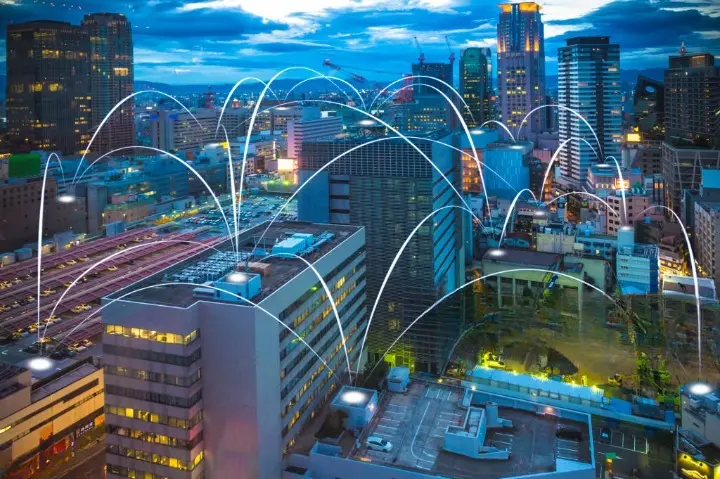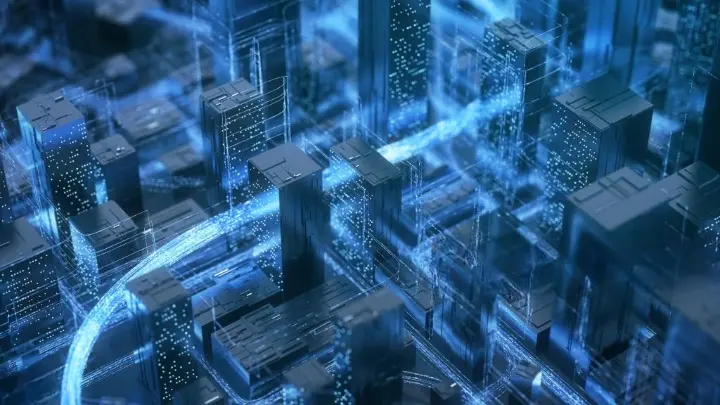
Smart Cities: How Urban Development is Changing Due to Technology
Around the globe, cities are utilizing technology to establish more sustainable, efficient, and habitable environments in response to the growing trend of urbanization and population densities. The idea of “smart cities” is a revolutionary approach to urban development that makes use of cutting-edge technology and data analytics to raise quality of life, solve problems associated with contemporary urban living, and improve city services. This article examines the ways in which technology is influencing urban development, the advantages of smart cities, as well as the difficulties and potential benefits of this cutting-edge strategy.
What Makes a City Smart?
A smart city is one that combines data-driven solutions and digital technology to improve infrastructure, services, and government, among other facets of urban life. A smart city’s essential components include:
Connectivity: In order to collect and transfer data from a variety of sources, including sensors, devices, and infrastructure, smart cities depend on strong network connectivity, including the Internet of Things (IoT).
Data analytics: Cities can handle and comprehend vast amounts of information through the use of big data and sophisticated analytics, which promotes informed decision-making and efficient city management.
Sustainability: By adopting energy-efficient technologies, lowering carbon footprints, and encouraging ecologically friendly behaviors, smart cities place a high priority on sustainability.
public Engagement: By enabling citizens to access information, offer input, and communicate with city services via digital platforms, technology in smart cities improves public participation and engagement.
Important Technology Advancing Smart Cities
The creation and operation of smart cities depend on a number of technologies:
1. the Internet of Things
The Internet of Things (IoT) is a network of sensors and gadgets that are connected and exchange data. IoT applications in smart cities include:
Smart traffic management is made possible by IoT sensors that track traffic patterns and congestion, allowing for real-time traffic signal adjustments that cut down on delays.
Smart Parking: By providing information about available parking spaces, IoT-enabled parking meters and sensors assist cars in finding parking more quickly.
Environmental Monitoring: Internet of Things (IoT) devices monitor weather, noise levels, and air quality, providing information to solve environmental problems and enhance public health.
- Analytics and Big Data
Big data analytics is the process of handling and examining massive amounts of data in order to derive insights and make decisions based on facts. Among the big data applications in smart cities are:
Predictive maintenance minimizes downtime and repair expenses by using data from sensors and equipment to forecast when infrastructure elements, such water pipes or bridges, will require maintenance.
Urban Planning: By gaining a better understanding of population trends, land use, and transportation patterns, data analysis assists city planners in developing more sensible urban development plans.
Emergency Response: By giving information on occurrences, resource availability, and traffic conditions, real-time data analysis facilitates quicker and more effective emergency response.
- The use of machine learning and artificial intelligence (AI)
Algorithms using AI and machine learning examine data to find trends, forecast outcomes, and streamline workflows. Applications of AI in smart cities include:
Artificial Intelligence (AI) is used in smart grid management to optimize electricity distribution, control energy usage, and integrate renewable energy sources.
Public Safety: By seeing possible dangers and allocating resources more skillfully, AI-powered surveillance systems and predictive policing technologies improve public safety.
Customer service: AI-powered chatbots and virtual assistants streamline interactions with city services by offering information and assistance to residents.
- Technology of 5G
High-speed, low-latency communication is made possible by 5G technology and is necessary for smart cities to operate. Advantages of 5G consist of:
Enhanced Connectivity: 5G makes it possible for IoT devices to communicate with one another more quickly and reliably, which boosts the effectiveness of apps for smart cities.
Support for Emerging Technologies: 5G enables the development of cutting-edge urban solutions by supporting technologies like augmented reality and driverless cars.
Enhanced Capacity: 5G networks can support more connected devices at once, meeting the increasing demand for applications related to smart cities.
The advantages of smart cities
For cities and their citizens, the incorporation of technology into urban development has several advantages:
- A higher standard of living
Smart cities improve people’s quality of life by offering more effective amenities and services.
Improved Mobility: Smart transportation technologies facilitate more convenient and effective commuting by reducing traffic jams and enhancing public transportation.
Enhanced Safety: Quicker assistance during emergencies and increased public safety are two benefits of advanced surveillance and emergency response systems.
Cleaner Environment: Environmental monitoring and sustainable practices help to minimize pollution and provide cleaner air for a healthier living environment.
- Enhanced Efficiency Resource management and city operations are more efficient because to technology-driven solutions:
Energy Efficiency: By optimizing energy use, smart grids and energy management systems cut waste and utility expenses.
Water Management: To guarantee a dependable and effective water supply, smart water systems track usage, identify leaks, and control distribution.
garbage Management: Utilizing sensors to keep an eye on bin levels and optimize collection routes, smart garbage collection systems minimize operational expenses and their negative environmental effects.
- Development of the Economy
Smart cities stimulate economic growth by drawing investment and generating new opportunities.
Innovation centers: Smart cities act as centers for innovation, drawing startups and tech firms who are committed to creating ground-breaking solutions for urban problems.
Jobs: The adoption and upkeep of smart city technologies lead to job openings in data analysis, software development, and infrastructure management, among other disciplines.
Enhanced Efficiency: A more competitive and economically viable city is a result of streamlined services and effective resource management.
Smart City Challenges
Smart cities have advantages, but they also present a number of issues that need to be resolved.
- Security and Privacy
Concerns regarding security and privacy are raised by the massive collection and usage of data:
Data protection: A major issue facing smart cities is guaranteeing the security of personal data and shielding it from intrusions or breaches.
Concerns about Surveillance: In order to prevent potential abuse or overreach, the use of surveillance technologies must strike a balance between individual private rights and public safety.
- The Digital Gap
The difference between those who have access to technology and those who do not is known as the “digital divide”:
Accessibility: In order to achieve inclusivity and prevent inequality, it is imperative that all citizens have access to smart city services and technology.
Education and Training: To fully realize the advantages of smart cities, it is imperative to offer citizens with education and training to assist in adjusting to new technologies and digital services.
- Cooperation
It can be difficult to integrate different systems and technologies:
Standardization: By creating uniform frameworks and protocols for smart city technology, incompatibility is ensured and smooth system integration is facilitated.
- Coordination: Effective coordination between different stakeholders, including government agencies, technology providers, and community organizations, is necessary for successful smart city implementation.
The Future of Smart Cities
The future of smart cities is characterized by continued innovation and growth:
1. Integration of Emerging Technologies
As new technologies emerge, they will play a key role in shaping the future of smart cities:
- Blockchain: Blockchain technology can enhance transparency, security, and efficiency in various smart city applications, such as supply chain management and digital identity verification.
- Augmented Reality (AR) and Virtual Reality (VR): AR and VR technologies will offer immersive experiences for urban planning, public engagement, and interactive services.
Autonomous Vehicles: Transportation will be revolutionized by the incorporation of autonomous vehicles into smart city infrastructure, which will also reduce traffic and increase safety.
- Durability and Adaptability
Resilience and sustainability will be given top priority in future smart cities:
Green Infrastructure: Energy-efficient structures, renewable energy sources, and environmentally friendly transit networks are examples of the green infrastructure that smart cities will invest in.
Climate Adaptation: To address the effects of climate change, smart cities will put adaptive measures in place, such as disaster preparedness, flood control, and heat island reduction.
- Design with Citizens in Mind
User-centric solution creation will be the main goal of smart cities:
Customized Services: Technology will make it possible to provide services that are specific to each person’s requirements and preferences, enhancing quality of life overall.
Participatory Governance: By encouraging public engagement and participatory governance, smart cities will enable locals to influence decision-making and the direction of their communities.
conclusion
Smart cities are a revolutionary approach to urban planning that use technology to make places that are more sustainable, livable, and efficient. Smart cities are solving the problems of contemporary urban living and improving the quality of life for citizens by combining technologies like IoT, big data, AI, and 5G. Even though there are obstacles to overcome, such as interoperability problems, privacy concerns, and issues with the digital divide, the future of smart cities looks promising for ongoing innovation and advancement. Cities all around the world will open the door for an inclusive, resilient, and networked urban future as they adopt the smart city concept.READ MORE BLOGS

